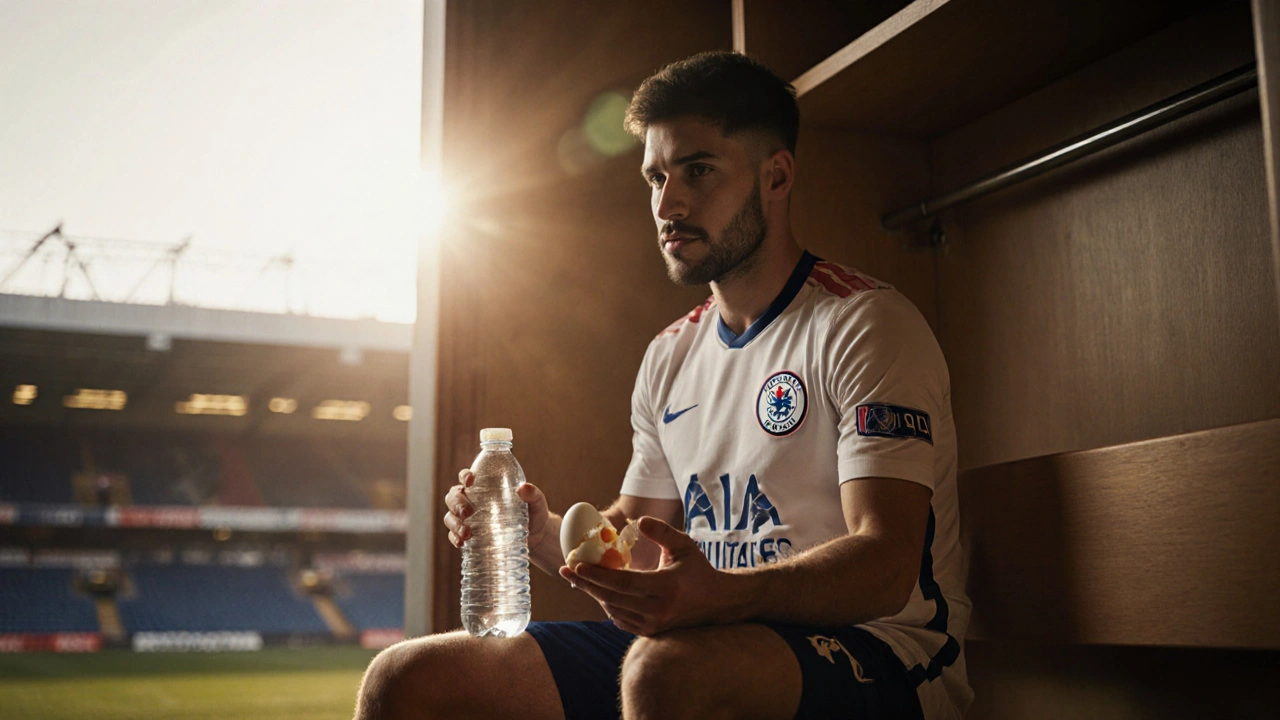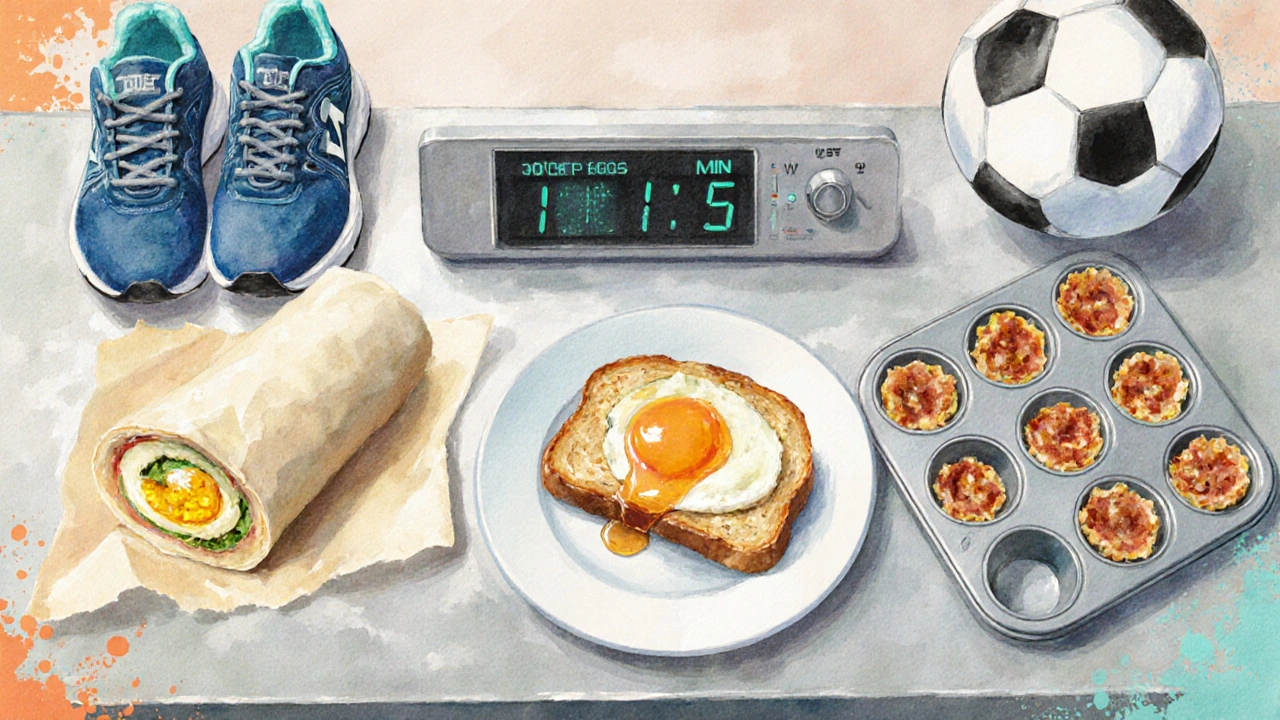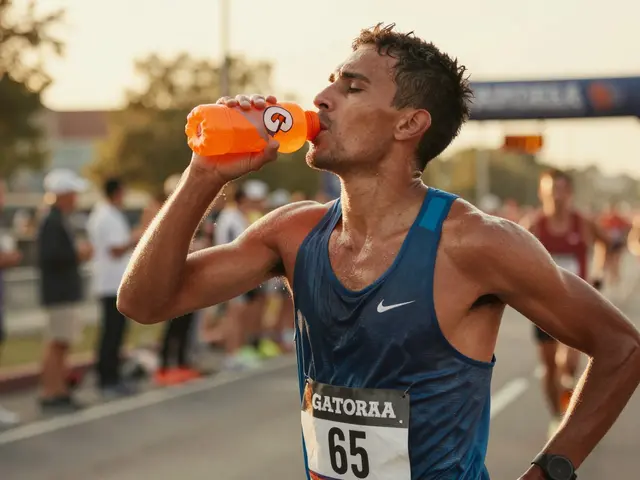Eggs as a Pre‑Game Meal: Benefits, Timing & How to Use Them

Pre-Game Egg Calculator
Optimize Your Pre-Game Nutrition
Calculate your ideal egg portion and carb pairing based on your activity type and timing.
Input Your Details
Recommended Nutrition
Enter your details to see recommendations
Are eggs a good pre‑game meal? If you’ve ever watched a professional athlete pop a hard‑boiled egg before a match, you’ve probably wondered if there’s science behind the habit. Let’s break down why eggs might be the secret weapon in your sports nutrition toolbox and how to get the most out of them.
What makes a pre‑game meal work?
A solid pre‑game meal does three things: it fuels your muscles, stabilises blood sugar, and avoids any stomach upset during activity. The timing usually falls 2‑4 hours before you start, giving your body enough time to digest and turn food into usable energy. Ideal foods combine high‑quality protein with moderate carbs and a little healthy fat, creating a steady release of glucose while also supporting muscle repair.
Eggs - the nutrition profile that matters
When you crack open Eggs are a compact source of protein, essential fats, vitamins and minerals, you’re getting a package that checks many of the boxes for a pre‑game snack. One large egg delivers about 6g of protein, 5g of healthy fats, and roughly 0.4g of carbs. The protein is packed with all nine essential amino acids, making it a complete protein source - a rarity in most plant‑based foods.
How protein from eggs fuels performance
Protein isn’t just for post‑exercise recovery; it also helps preserve muscle during the intense bouts of activity that happen in a game. The Protein in eggs is rich in leucine, an amino acid that triggers muscle protein synthesis right when you need it. That means starting a match with a protein‑rich snack can reduce the breakdown of muscle fibers that occurs when you’re running, jumping, or sprint‑ing.
Besides protein, eggs supply B‑vitamins like B12 and riboflavin, which support energy production at the cellular level. They also contain choline, a nutrient that aids nerve signaling - essential for reaction time and coordination.
Carbs, fats, and glycogen: balancing the energy mix
While eggs are low in carbs, pairing them with a small carb source (like a slice of whole‑grain toast or a banana) creates a balanced pre‑game plate. Carbohydrates are broken down into glucose, which replenishes Glycogen stores in your muscles. Those stores are the primary fuel for high‑intensity bursts, so a little extra carbs helps keep your sprint speed up throughout the game.
The fats in eggs, predominantly monounsaturated and omega‑3s (if you choose enriched eggs), slow digestion just enough to provide a steady energy release without feeling heavy. This slow‑release effect is why many athletes avoid sugary drinks right before intense activity - they can cause a rapid spike and subsequent crash.

When and how much to eat
The sweet spot for a pre‑game egg snack is 2‑3 hours before you hit the field. That window gives your stomach time to empty while still keeping amino acids in the bloodstream. A typical serving looks like two boiled or scrambled eggs with a slice of toast and a handful of berries. If you’re short on time, a portable option is a hard‑boiled egg plus an apple - easy to carry and digest.
For most athletes, 1‑2 eggs provide enough protein without overwhelming the digestive system. Larger athletes or those with higher energy demands can bump it up to three eggs, but watch the total fat intake to avoid feeling sluggish.
Quick egg‑based recipes for athletes
- Power‑Egg Wrap: Scramble two eggs with spinach, a sprinkle of feta, and roll in a whole‑grain tortilla. Wrap it in foil for a warm, handheld snack.
- Egg‑Banana Toast: Mash a ripe banana on whole‑grain toast, top with a sliced boiled egg, and drizzle a teaspoon of honey for a sweet‑savory combo.
- Egg‑Mushroom Mini‑Frittatas: Mix beaten eggs, chopped mushrooms, and a dash of pepper; bake in a muffin tin for 15 minutes. Store in the fridge and grab one on game day.
Eggs vs. other pre‑game foods
| Food | Protein (g) | Carbs (g) | Fat (g) | Cost (AU$) | Convenience | Glycemic Impact |
|---|---|---|---|---|---|---|
| Eggs (2 large) | 12 | 0.8 | 10 | 0.60 | High (hard‑boiled) | Low |
| Banana (1 medium) | 1.3 | 27 | 0.4 | 0.25 | Very High | Medium‑High |
| Oatmeal (½ cup dry) | 5 | 27 | 3 | 0.30 | Medium (needs prep) | Medium |
| Energy Drink (250ml) | 0 | 30 | 0 | 2.00 | Very High | High |
The table shows that eggs pack a protein punch that most carb‑heavy options lack, while keeping the glycemic impact low. That combo helps prevent blood‑sugar swings and supports steady energy output.

Pros and cons of using eggs pre‑game
- Pros: Complete protein, easy to prepare, affordable, low glycemic load, provides essential micronutrients.
- Cons: Low carb content on its own, may not suit vegans, requires pairing with a carb source for optimal glycogen replenishment.
Frequently Asked Questions
Frequently Asked Questions
Can I eat eggs right before a game?
Ideally, give yourself 2‑3 hours to digest. A quick hard‑boiled egg right before a match can feel heavy, but a small portion of scrambled egg with toast works for many athletes.
How many eggs should I eat before training?
One to two eggs is a good starting point. Adjust up to three if you’re larger or have higher calorie needs, but keep the total fat below 15g to stay light.
Are egg whites better than whole eggs for pre‑game fuel?
Egg whites give pure protein without fat, which can be useful if you’re watching fat intake. However, the yolk supplies healthy fats and nutrients like choline that aid nerve function, so whole eggs often provide a more balanced package.
Should I combine eggs with carbs or eat them alone?
Pairing eggs with a moderate carb source (toast, fruit, or a small grain bar) helps replenish glycogen and stabilises blood sugar, leading to steadier performance.
Do eggs work better than sports energy drinks?
Energy drinks deliver fast carbs and caffeine, which can cause a spike and crash. Eggs provide lasting protein and nutrients without the jitter, making them a more sustainable pre‑game option for most athletes.
Give eggs a try in your next pre‑game routine, experiment with timing and combos, and see how your energy, focus, and recovery respond. The next time you’re gearing up for a match, the answer might just be a simple, portable protein pack sitting in your cooler.






Comments (15)
Paritosh Bhagat
13 Oct 2025
Eggs pack a protein punch that can be digested steadily before a match, providing the amino acids needed for muscle preservation while keeping blood sugar stable.
Jawaharlal Thota
22 Oct 2025
When you plan a pre‑game routine, think of eggs as the cornerstone of a balanced plate, because they deliver high‑quality protein, essential fats, and a suite of micronutrients that support both energy production and mental acuity. Start by timing your intake two to three hours before kickoff, giving your stomach enough time to empty while keeping amino acids circulating. Pair two boiled eggs with a slice of whole‑grain toast and a handful of berries; the carbs replenish glycogen, the fruit adds antioxidants, and the toast adds a gentle fiber boost. If you prefer a warm option, scramble the eggs with spinach and a sprinkle of feta, then wrap them in a tortilla for a handheld meal that’s easy to eat on the go. For larger athletes, consider adding a third egg, but watch total fat to stay light on the field. Hydration matters too, so drink water alongside your egg snack to aid digestion. Remember that the leucine content in eggs triggers muscle protein synthesis, which can help blunt muscle breakdown during intense bursts. The choline in the yolk supports nerve signaling, sharpening reaction time. Eggs also contain B‑vitamins that act as co‑factors in cellular energy pathways, turning the food you eat into usable power. By keeping the carb source moderate, you avoid the spike‑and‑crash effect of sugary drinks. Over the long term, consistently incorporating eggs into your pre‑game meals can improve recovery and promote lean muscle maintenance. Experiment with different pairings-banana, oatmeal, or avocado toast-to find what feels best for your digestion. Keep a small stock of hard‑boiled eggs in the fridge for those rushed mornings when preparation time is limited. On game day, a quick bite of an egg and an apple can supply a tidy balance of protein and carbs without feeling heavy. Most importantly, listen to your body; if an egg feels too rich, switch to egg whites plus a carb‑rich side. Consistency and timing are key, and eggs fit neatly into both.
Andrew Nashaat
30 Oct 2025
Eggs serve as a reliable source of complete protein, and when you combine them with a modest carb like toast, you create a synergy that fuels performance, stabilizes blood sugar, and keeps digestion smooth, which is vital for any athlete.
Gina Grub
8 Nov 2025
Integrating ova into the pre‑match metabolic schema elevates ergogenic output, the yolk‑derived phospholipids modulating neuronal excitability, whilst the protein matrix sustains anabolic signaling pathways.
Richard H
17 Nov 2025
American athletes know that a hard‑boiled egg beats any sugary cheat any day.
Megan Blakeman
26 Nov 2025
Eggs are a solid pre‑game option, they give you protein and fats, and they’re cheap too! :) They pair well with toast or fruit, which adds carbs for quick energy. Make sure to eat them 2‑3 hours before the game, so your stomach has time to settle. Good luck on the field! :)
Akhil Bellam
5 Dec 2025
Behold the humble egg, a culinary marvel that transcends mere breakfast fare, delivering a spectrum of nutrients with a poise that most processed snacks can only dream of; its yolk, a golden reservoir of omega‑3s and choline, orchestrates neuronal signaling while the albumen provides a pristine protein matrix replete with leucine, the very trigger of muscle synthesis.
Amber Swartz
14 Dec 2025
Only the truly dedicated would ignore the power of a well‑timed egg snack; let’s be honest, anything else feels like a compromise, and the drama of a rushed sugary drink just doesn’t compare to the quiet confidence of a boiled egg on your plate.
Robert Byrne
22 Dec 2025
Eggs give athletes a stable source of protein that helps preserve muscle during high‑intensity bouts, and pairing them with a modest carb like whole‑grain toast fuels glycogen stores without the crash of sugary drinks.
Zoe Hill
31 Dec 2025
Eggs are a great way to keep your energy steady, just make sure you add a little fruit or toast so you get some carbs too :) It really does the trick for many players.
Albert Navat
9 Jan 2026
From a performance standpoint, eggs are a low‑glycemic protein source that dovetails nicely with a small carb load, offering a balanced macronutrient profile that supports sustained output.
Tyler Durden
18 Jan 2026
Eggs are a powerhouse pre‑game choice, delivering high‑quality protein and healthy fats; combine them with toast or a banana for that needed carb boost, and you’ll maintain steady energy throughout the match.
allison berroteran
27 Jan 2026
Consider the egg not just as food but as a strategic element in the athlete’s toolkit, because it supplies essential amino acids that underpin muscle integrity, and its yolk contributes choline, a nutrient pivotal for neurotransmission and rapid decision‑making on the field. Timing is equally crucial; ingesting the egg‑based snack two to three hours pre‑game aligns digestion with the peak of amino acid availability, ensuring that the muscles are primed for the upcoming exertion. Pairing the egg with a modest carbohydrate source, such as whole‑grain toast or a banana, replenishes glycogen stores without inducing a sudden insulin surge that could compromise performance. The modest fat content, particularly the monounsaturated fraction, moderates gastric emptying, thereby providing a sustained release of energy that avoids the dreaded mid‑game crash. For athletes with heightened caloric needs, scaling up to three eggs remains viable, provided the overall lipid intake stays within a range that does not impede mobility or cause gastrointestinal distress. Moreover, the B‑vitamin complex inherent in eggs-especially B12, riboflavin, and biotin-facilitates aerobic metabolism, converting the macronutrients consumed into usable ATP. From a physiological perspective, the synergistic effect of protein and carbs in this context supports both anabolic processes and immediate fuel demands, a balance that many commercial sports drinks fail to achieve. It is also worth noting that the micronutrients, including selenium and vitamin D, contribute to oxidative stress mitigation, a factor that becomes increasingly relevant during prolonged, high‑intensity activity. By incorporating eggs into the pre‑game regimen, athletes can thus experience improved endurance, sharper cognitive function, and a more controlled metabolic response.
Gabby Love
4 Feb 2026
Eggs provide a reliable protein source; adding a slice of whole‑grain toast gives the carbs needed to top off glycogen stores before a match.
Jen Kay
13 Feb 2026
While some athletes might chase the flash of energy drinks, a humble egg paired with toast offers a steadier, more sustainable fuel-just the kind of disciplined choice that separates the pros from the amateurs.